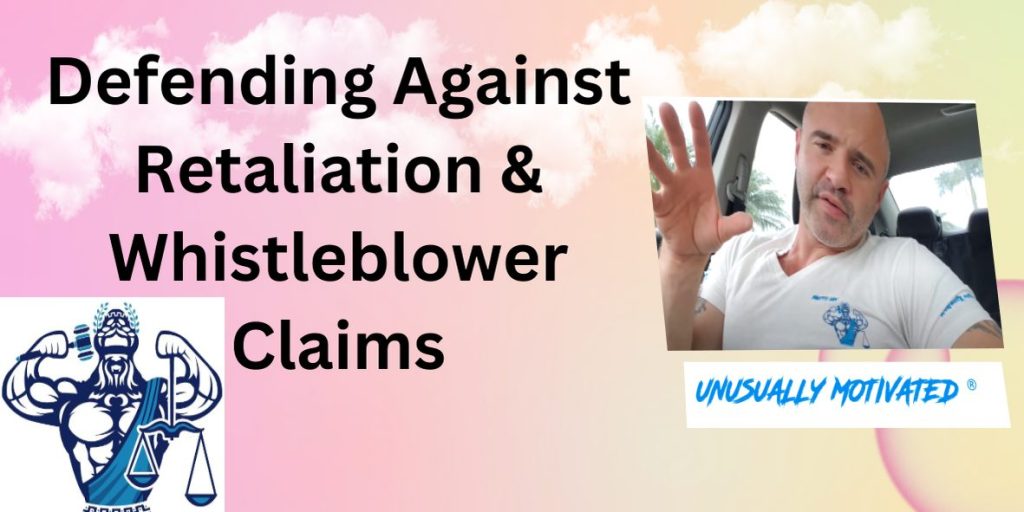From Miletti Law®, the home of the #UnusuallyMotivated movement, we highly appreciate that you, our unusually motivated® readers, take the time to read our trustworthy & distinctive content that aims to keep you informed and educated about the diverse legal and non-legal issues that affect you or your businesses. As usual, our content is featured as videos that are posted on our YouTube Channel https://www.youtube.com/channel/UCtvUryqkkMAJLwrLu2BBt6w and blogs that are published on our website WWW.MILETTILAW.COM. We highly encourage you to subscribe to the channel and sign up for the Newsletter on the website to experience, firsthand, the unusually motivating effect of the knowledge and legal counsel bombs we drop.
This blog is a sub-series of our recently introduced series on an update of the laws that apply to workplace harassment, discrimination, & retaliation in New York. In Part I of the main series, we introduced and discussed four New York (both city and state) laws that govern and cover issues of workplace harassment, discrimination, & retaliation. These laws include the New York City Human Rights Law (NYCHRL) (NYC Administrative Code 8-101 et seq.), the New York Equal Pay Act (N.Y. Lab. Law § 194), the New York State Human Rights Law (NYSHRL) (N.Y. Exec. Law § 290 et seq.), and the Reproductive Health Discrimination Protection (N.Y. Lab. Law § 203-e).
In the current blog, we would like to switch lanes, but not the gears, because we need to maintain the same speed. Why do we need to do this? Well, New York is Nazareth to us, but we also like preaching in Judea and Samaria. In that spirit, we found it imperative to introduce and enlighten you about the various federal laws that cover not only employees and employers in New York, specifically in relation to workplace harassment, discrimination, & retaliation, but in other states as well.
For this reason, this blog is Part I of the subseries on those federal laws that are applicable to workplace harassment, discrimination, & retaliation in New York and other states. A brief overview of five of these laws is provided below:
Americans with Disabilities Act (ADA) (42 U.S.C. § 12101 et seq)
The ADA is a federal law that prohibits most public and private employers from discriminating against employees based on their disabilities. Under the law, covered employers are also obligated to make reasonable accommodations for persons who suffer from a disability, unless the requested accommodation would cause the employers to go through an undue hardship.
Title VII of the Civil Rights Act of 1964 (Title VII) (42 U.S.C. § 2000e et seq.)
Usually known as Title VII, this is one of the most popular laws when it comes to harassment and discrimination issues. In addition to prohibiting retaliation, Title VII offers protections to employees and applicants from harassment and discrimination based on a variety of attributes and characteristics that include, but not limited to, sex (including gender identity, sexual orientation, and pregnancy), color, race, religion, and national origin.
In a landmark lawsuit whose verdict was reached on June 15, 2020, the U.S. Supreme Court held that any form of discrimination based on gender identity and sexual orientation is part and parcel of Title VII’s prohibitions on discriminations.
Pregnancy Discrimination Act (PDA), 42 U.S.C. § 2000e(k)
Despite being a very popular federal law, most people are not aware that the PDA is an amendment made to Title VII to provide protections for employees against discrimination based on pregnancy, childbirth, or associated medical conditions.
Fair Labor Standards Act (FLSA) (29 U.S.C. § 201 et seq.)
The FLSA is another federal law that is concerned with setting standards relating to overtime compensation, child labor, and minimum wage. Further, the law also prohibits any acts of retaliation against employees who take part in certain types of protected activity including:
- Filing a discrimination complaint under the FLSA with the DOL (Department of Labor) or in court. These complaints include those filed under the Equal Pay Act (EPA), which was passed by the Congress as an amendment to the FLSA’s minimum wage requirements;
- Serving on an “industry committee”; and/or
- Testifying in any proceeding under the EPA or FLSA.
Age Discrimination in Employment Act (ADEA) (29 U.S.C. § 621 et seq.)
As the name suggests, ADEA is a federal law that prohibits harassment, discrimination, and retaliation against persons aged 40 years or older in public and private employment based on their age.
Equal Pay Act (EPA) (29 U.S.C. § 206(d))
As mentioned above, EPA is part of the FLSA. Generally, by requiring employers to pay equal wages for equal work to female and male employees and, the federal law prohibits discrimination in the form of wage disparities between the male and female genders.
In Part II of this sub-series, we will continue looking into more federal laws that are applicable to workplace harassment, discrimination, & retaliation issues, not only in New York, but in other states as well.
Till then stay tuned and, as usual, always be #UnusuallyMotivated! In the interim, reach us with questions or comments on our website at the Contact Us page!
Always rising above the bar,
Isaac T.,
Legal Writer & Author.
 314-648-2586
314-648-2586 CALL US NOW
CALL US NOW








